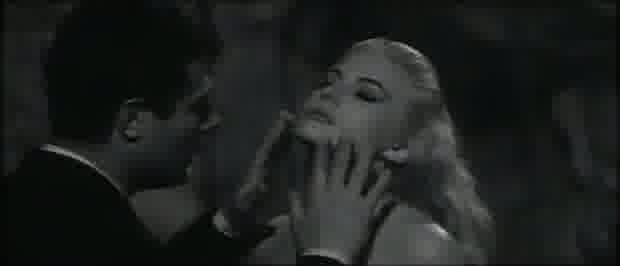Directed by:
Federico FelliniCinematography:
Otello MartelliComposer:
Nino RotaCast:
Marcello Mastroianni, Anita Ekberg, Anouk Aimée, Yvonne Furneaux, Magali Noël, Alain Cuny, Riccardo Garrone, Evelyn Stewart, Lex Barker, Annibale Ninchi (more)VOD (1)
Plots(1)
It’s a spectacular and relevant play in which Mastroianni plays a journalist disillusioned by the paparazzi life-style and jaded by a relationship grown stifling. Filled with gloriously memorable images, the shot of a helicopter lifting Christ’s statue out of Rome is iconic. (Cult Films)
Videos (1)
Reviews (7)
While some scenes and the fates of some of the characters probably appealed to me exactly as they should have, I was rather bored for most of the drawn-out, gigantically overblown runtime. Not enough to keep me from making it to the end, but still enough. I will gladly give La dolce vita another chance, because it definitely needs it, but I won't be in a rush to do it.__P.S. Beautiful music by Rota.
()
Sometimes I have a little problem with these long-established movies because I don't see their contribution and they do not entertain me. However, Federico Fellini made a film that is narratively interesting, even though it is almost three hours long. This opus about society, with such beautifully scathing criticism, just has to be liked.
()
Some people don’t know what the three hours of La Dolce Vita are about, and yet it’s evident in every elaborate shot, in every sweet sounding Italian line packed with multiple meanings, and in every facial gesture that the bohemian, doomed paparazzo Marcelo Mastroianni conjures up on his charismatic face. A brilliantly constructed and harmonic story, where Fellini manages to turn countless bitterly symbolic scenes into iconic and often quoted moments of world cinema thanks to their visual perfection and universally accessible melodramatic character. The blonde diva bathing in the fountain while the blinded Marcello fetches milk for a stranger's kitten at her request, the hordes of journalists circling the social elite like annoying flies, the abuse of a drunken girl for a humiliating dance and finally the ending itself, when the hero, despite the sea surf and the screams of his companions, does not understand the words of the unspoiled young girl and turns his back on her, facing his moral doom. All of these are wonderful cinematic and unforgettable scenes that of course make for a delightful, or rather, sweet viewing experience. 95%
()
Thanks for the depression, Maestro Fellini... It's been a long time since I've felt this miserable after watching a film as I am right now. La Dolce Vita is a sweetly frosted film, but beneath the surface it's as bitter as quinine. Visually, it acts as a mask – all those lavish parties, expensive gowns, bizarre cabarets, beautiful women... this is all just a cover for the inner emptiness of the world that Fellini displays with typical perspective and light sarcasm. Although one can withstand such a portrait of the "bourgeois" world of stars, it would not be Fellini not to let ordinary life and reality be mirrored in this artificial universe of artificial people. A reality that, through ubiquitous photographers and journalists, parasites on the aura of the "sweet" world of the rich and famous. And somewhere on the edge between the two worlds (the ordinary and "sweet") Marcello, brilliantly portrayed by M. Mastroinanni, staggers. He is a hero belonging to the thematic family of both Amarcord and Roma (whether he is the main character in the latter, or a common motive for leaving the harmonious countryside and fascination with the big world), at first glance a hedonist, at second glance an absolute loser whose inner emptiness is surrounded by a bleak apartment and eternally despairing girlfriends. Marcello grazes on the gloss, seducing one woman after another, sinking deeper and deeper into the void, despair. La Dolce Vita is nothing more than a game in which actors lose themselves and become a grotesque masks of wealth, beauty and success. And the outside world is similar, devouring the surface, devouring media-chewed information, sometimes reminiscent of a script directed by a malicious director (the sequence with a gathering after the alleged appearance of the Virgin Mary). And Marcello, instead of finally choosing a path in the midst of a general decline, when all values lose their meaning, sinks deeper and deeper into the sweet mud. Fellini offers nothing comforting; there is a bit of tragedy behind every humorous moment, traditional rescue themes such as motherhood, and others (the drastic scene with Steiner and his family) do not work either. All this is filmed with a large portion of film stylization (compared to the later documentary interest of Roma) and the fascination with visual, but at the same time, in a way cool, almost surgically accurate. To luxuriate, to search, to analyze and at the same time not be drawn in, is how I would probably describe Fellini's "baton" over this symphony of futility. La Dolce Vita is a damn bitter film. Bitter by seeing stylized beauty and feeling a completely prosaic nothingness with a pretty face. At some points, it may seem quite long-lasting, but in the end it is absolutely masterful. Bravo!
()
Sweet, but impenetrable. Just as Fellini can captivate and almost carry away in some dialogues, he can equally thoroughly bore in this demanding three-hour film. Mastroianni plays the bohemian to the fullest, but his Marcello lacks the necessary character weight that such a presence deserves. However, what disappoints me the most is the change from intimate drama to heavy criticism, which makes the whole film disintegrate into several parts that more or less cease to relate to each other. So, I remain somewhat at a loss in my evaluation. I can feel the power that this film can offer, which only a good film can provide, but it couldn't fully reach me.
()
Gallery (127)
Photo © Pathé Consortium Cinéma



Ads